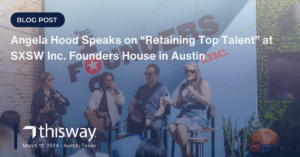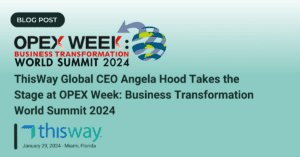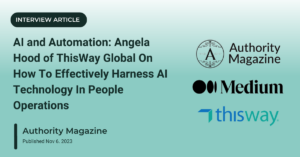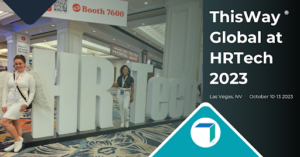Author: Denise Power
Intensifying competition for talent has employers turning to technology that finds answers humans can’t.
Like with many other facets of the business world, artificial intelligence (AI) is beginning to streamline what once were solely human-performed human resources processes. — Getty Images/Delmaine Donson
It’s time for HR teams to play catch-up on AI.
Sales and marketing were first-movers on artificial intelligence, and now human resources is waking up to AI’s power to heighten efficiency and effectiveness of sourcing, recruiting, hiring and onboarding workers.
No one denies HR is a laggard and executives acknowledge they are unsure how to proceed. Only 14% of companies invested in AI for HR over the past two years, according to KPMG’s “The Future of HR 2019.” A full 50% of those polled admitted to being “not at all prepared” to respond strategically as AI and machine learning emerge. HR’s entrenched “task-oriented” culture is the chief obstacle to digital innovation, KPMG reported.
Meanwhile, a whopping 81% of 9,400 executives polled for the “2019 Deloitte Global Human Capital Trends” report characterized their recruiting practices as merely “standard” or “below standard.”
Factor in legal, ethical, privacy and discrimination bugaboos surrounding AI and it’s no wonder HR has moved carefully in an increasingly litigious work world. Today’s tight job market is changing all this with power shifting from employers to job candidates, said Sujay Rao, vice president, general manager, talent acquisition products at Korn Ferry.
The employer is no longer king, Rao told CO—. “Now it’s the candidate who is king. Candidates want to be treated well because they have a lot of opportunities. Why would they talk to you if you do not treat them well?”
With AI automating routine tasks such as scheduling interviews and updating candidates on status of their application, HR is freed up to engage candidates on a deeper level.
Well-treated applicants often evangelize companies courting them, and that’s social media gold for employers competing for talent. Applicants treated respectfully — no longer “ghosted” by employers — are more likely to respond to future recruitment outreach, too. Deployed in HR, artificial intelligence can:
- Analyze and shortlist resumes.
- Scrape social media channels and other sources to build candidate profiles.
- Interact with applicants via conversational chatbots like Mya.
- Collect information via voice and text.
- Conduct video interviews.
- Analyze vocal tone, facial expressions and body language.
The power of AI is extraordinary and it keeps on surpassing human abilities at a quick rate.
Wayne Elsey, CEO of Elsey Enterprises
How AI works in HR
Artificial intelligence is driven by algorithms — sets of rules based in part on historical data that computers use to guide decisions. For example, if history shows that employees possessing specific traits have proven successful in a given job role, AI algorithms rank highly applicants with those same attributes.
While AI automates mundane tasks, it’s the greater power of AI that gives HR pause. Employers know they are prohibited from asking applicants about marital status and religion, but if AI teases out that information indirectly, without consent, companies run the risk of violating discrimination laws.
“There are still a lot of bugs. One bug is discrimination. There are examples where women and older applicants have been weeded out,” said Rob Wilson, president, Employco USA, an HR outsourcer.
In some instances, though, having a bias is good.
For example, Pymetrics, a provider of an AI-driven job-matching solution which analyzes candidates’ cognitive and emotional traits through online quizzes and game-playing, revealed that top-performing salespeople at one company were risk-takers — highly impulsive with short attention spans. It’s those qualities that might otherwise disqualify a candidate that this particular employer should prioritize when recruiting new salespeople, Pymetrics concluded. That’s a good bias because it’s based on suitability to the role.
However, when AI algorithms are based on historical data that contain unfair bias like gender, algorithms will mirror that bias as Amazon discovered before abandoning a resume analysis tool it developed several years ago, as Reuters reported. Along with Amazon, companies like Google, IBM and Microsoft have taken proactive steps to eliminate bias in AI.
Overcoming the potential for bias
Having worked in the male-dominated construction industry before founding ThisWay, an AI-driven talent sourcing company, CEO Angela Hood is well-acquainted with workplace bias. “I understand what it means for people to have the view that [women] can only have the job of secretary, that there is no way a woman can be the engineer,” she told CO—.
“We had to teach our technology that there is no ‘man’ and no ‘woman’ – no concept of gender,” she said. For instance, the words prom “king” or “queen” on a resume are converted to gender-neutral “regent” to remove bias as AI screens applicant qualifications.
Hood said her company’s algorithms are based on extensive machine learning R&D, ongoing client feedback and its massive data set sourced from some 3,000 business partners – alumni programs, unions, job boards, certification agencies – with access to 400 million job candidates worldwide.
Wayne Elsey, CEO of marketing firm Elsey Enterprises, uses AI to rank applicants’ suitability based on job criteria – with human involvement. “We have people review all resumes because we don’t want AI to make decisions without any consideration from humans,” he told CO—. “Our team recognizes that while AI is good for helping managers, it’s not something we intend to rely on to the exclusion of involvement of human managers.
“The power of AI is extraordinary and it keeps on surpassing human abilities at a quick rate,” Elsey added. “AI does not deal directly with issues of legal compliance, ethics and integrity. That’s left to humans, and business leaders have to understand the AI platforms they are bringing into their businesses.”
CO— aims to bring you inspiration from leading respected experts. However, before making any business decision, you should consult a professional who can advise you based on your individual situation.









